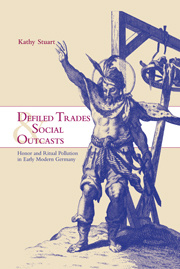Description
Defiled Trades and Social Outcasts
Honor and Ritual Pollution in Early Modern Germany
Cambridge Studies in Early Modern History Series
Author: Stuart Kathy
A social and cultural history of 'dishonourable people' (unehrliche Leute) in early modern Germany.
Language: English
Subject for Defiled Trades and Social Outcasts:
Approximative price 122.57 €
Subject to availability at the publisher.
Add to cart
Defiled trades and social outcasts honor and ritual pollution in early modern germany
Publication date: 05-2000
300 p. · 15.9x23.6 cm · Hardback
Publication date: 05-2000
300 p. · 15.9x23.6 cm · Hardback
Approximative price 60.02 €
Subject to availability at the publisher.
Add to cart
Defiled trades and social outcasts: honor and ritual pollution in early modern germany
Publication date: 11-2006
300 p. · 15.2x23 cm · Paperback
Publication date: 11-2006
300 p. · 15.2x23 cm · Paperback
Description
/li>Contents
/li>
This book presents a social and cultural history of 'dishonourable people' (unehrliche Leute), an outcast group in early modern Germany. Executioners, skinners, grave-diggers, shepherds, barber-surgeons, millers, linen-weavers, sow-gelders, latrine-cleaners, and bailiffs were among the 'dishonourable' by virtue of their trades. This dishonour was either hereditary, often through several generations, or it arose from ritual pollution whereby honourable citizens could become dishonourable by coming into casual contact with members of the outcast group. The dishonourable milieu of the city of Augsburg from the sixteenth to the eighteenth centuries is reconstructed to show the extent to which dishonour determined the life-chances and self-identity of dishonourable people. The book then investigates how honourable estates interacted with dishonourable people, and how the pollution anxieties of early modern Germans structured social and political relations within honourable society.
List of illustrations; Acknowledgments; List of abbreviations; Glossary; Introduction: defiled trades; Part I. The Meaning of Dishonor in Early Modern Society: 1. Medieval versus early modern dishonor; 2. Honor, status and pollution; Part II. The Dishonorable Milieu: 3. The status of executioners and skinners, 1500–1700; 4. Living on the periphery of dishonor; Part III. Paradoxical Dishonor: Punishment and Healing: 5. The infamous fur coat, or the unintended consequences of social discipline; 6. The executioner's healing touch: health and honor in early modern German medical practice; Part IV. Artisanal Honor and Urban Politics: 7. Guardians of honor: artisans versus magistrates; 8. Honor and dishonor in the eighteenth century; Conclusion: dishonor and the society of orders; Select bibliography; Index.
© 2024 LAVOISIER S.A.S.
These books may interest you

Honor and Shame in Early China 41.94 €



